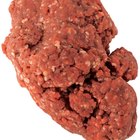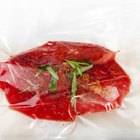
Digital Vision./Photodisc/Getty Images
While you can cook meat gone bad, you cannot safely eat it, because you might contract food poisoning if you eat cooked, spoiled meat. At best, this means stomach pain, nausea and diarrhea; at worst, food poisoning can kill. Keep purchased meat fresh by freezing what you cannot eat within a safe period, and inspect raw meat for signs of spoilage before you cook it.
Toxins
You know that cooking kills some bacteria such as Escherichia coli and Salmonella, so it is reasonable to think that cooking will kill all of the bacteria present in meat that has gone bad. While cooking meat properly will destroy these forms of bacteria, it will not kill all the toxins and microorganisms caused by the bacteria. These toxins and microorganisms persist in the meat and can even continue to grow after the cooking process. These can still cause food poisoning. Meat that was not cooked to the proper temperature can have microorganisms, toxins and bacteria. Additionally, ground meat must be cooked to 165 F, because toxins ground into the interior of an undercooked patty or loaf will not be killed at 145 F that the USDA recommends for whole cuts of meat.
Signs of Food Poisoning
Food poisoning generally sets in within 8 to 48 hours of eating the contaminated food, depending on the bacteria or toxin responsible. For example, Listeria monocytogenes, present in spoiled luncheon meats and hot dogs, sets in within 9 to 48 hours, according to MayoClinic.com. Symptoms of food poisoning may include headache, fever, diarrhea, nausea and vomiting. One particular bacterium, Clostridium botulinum, can cause vision problems, paralysis and death. Pregnant women, older adults and those suffering from chronic illness are at greater risk of contracting food poisoning, warns FoodSafety.gov.
Signs Meat Has Turned
Fresh meats display several signs that they have gone bad. The meat may feel slimy or sticky when you touch it. It may smell very bad but it may not; you cannot trust your sense of smell when determining whether meat has turned. Instead of appearing red or pink in color, the meat may look green, gray or dull brown. If you observe any of these signs, dispose of the meat and do not cook it. Meat can be spoiled and not smell bad. If you lose power for more than 12 hours, throw away any meat in the refrigerator. Refrigerate fresh meat at or below 40 degrees F for no longer than five days per FoodSafety.gov, and freeze fresh meat at or below 0 F for six to 12 months. For ground meat, refrigerate for no longer than two days and freeze for no longer than four months.
Safe Meat Cooking
Even fresh meat can cause food poisoning if it has not been cooked properly. Follow safe food handling guidelines when cooking meat. The U.S.D.A. advises that you cook all meat to their recommended safe temperatures -- 145 F for fresh meat and 165 F for ground meat -- to kill bacteria. Bacteria grows fastest in the "danger zone" of 40 F to 140 F. Limit the time spent in this zone by serving meat right after cooking, or keeping meat above 140 F until serving.
Related Articles

Indications of Refrigerated Cooked Meat ...

How Do I Tell If Pork Has Turned Bad?

What Does Spoiled Meat Smell Like When ...

Should You Cook Raw Meat That's Gone ...

Why Is It Hard for Humans to Eat Raw ...

What Happens to Boneless Chicken if I ...

How to Know if Bacon Has Gone Bad

Dangers of Spoiled Ground Beef

How Can I Tell If Lunch Meat Has Gone ...

Rules for Thawing and Refreezing Meat

How to Know if a Steak Is OK to Cook

How to Know When Pork Roast Goes Bad

What Are the Dangers of Eating Venison?

How Long Can Raw Meat Sit Out?

How Long Does It Take for Ground Beef ...

What Happens if You Cook Steak a Day ...
Can You Use Stew Meat That Has Been ...

Can You Eat a Hamburger That Is Pink ...

How to Know if Marinated Steak Is Bad

Should I Cook My Turkey if It Is Smelly?
References
- Wisconsin Nutrition Education Program: Keeping Food Safe
- Society for General Microbiology: Microbes and Food - 5. Food Poisoners
- University of Maine Cooperative Extension Publications: Safety of Refrigerated Foods After a Power Outage
- MayoClinic.com: Food Poisoning - Causes
- FoodSafety.gov: Storage Times for the Refrigerator and Freezer
- FoodSafety.gov: Food Poisoning
Writer Bio
A successful website writer since 1998, Elton Dunn has demonstrated experience with technology, information retrieval, usability and user experience, social media, cloud computing, and small business needs. Dunn holds a degree from UCSF and formerly worked as professional chef. Dunn has ghostwritten thousands of blog posts, newsletter articles, website copy, press releases and product descriptions. He specializes in developing informational articles on topics including food, nutrition, fitness, health and pets.
Photo Credits
Digital Vision./Photodisc/Getty Images